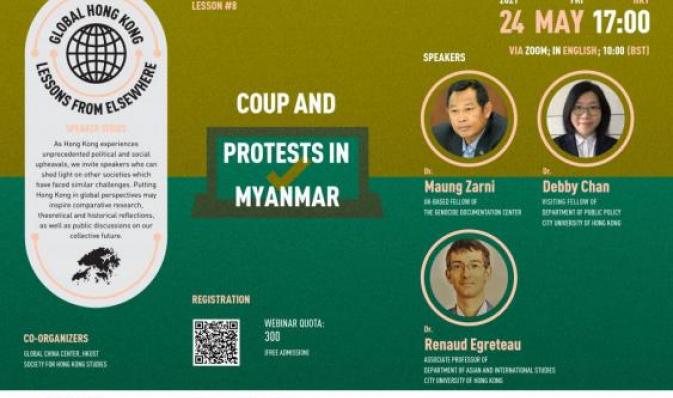
About the "Global Hong Kong: Lessons from Elsewhere" Speaker Series
「全球香港:他山之石」講座系列
As Hong Kong experiences unprecedented political and social upheavals, we invite speakers who can shed light on other societies which have faced similar challenges. Putting Hong Kong in global perspectives may inspire comparative research, theoretical and historical reflections, as well as public discussions on our collective future.
我們與 香港學會(Society for Hong Kong Studies ) 合作策劃了一個名為「全球香港:他山之石」的講座系列,邀請全球學者、知識分子分享在面對社會困局時的經驗及對策,務必以比較視角去為香港反思過去,展望將來。
.COUP AND PROTESTS IN MYANMAR
Dr. Renaud EGRETEAU (CityU of HK) , Dr. Maung Zarni and Dr CHAN, Sze Wan Debby(CityU of HK)
24th May 2021 (Mon) 17:00 (HK), 10:00 (UK)
Language: English
Please register HERE to secure your place
Abstract of Dr. Renaud EGRETEAU's talk: Myanmar coup: seizing power, losing control?
The Myanmar armed forces have seized control of government for the fourth time since independence. However, the coup d’état triggered mass protests across the country and a powerful civil disobedience movement has emerged. How to make sense of this military takeover and the popular, highly organised popular resistance it has sparked? Why now and to what ends? What does it mean for the constitutional and political process at work since the disbanding of the previous military regime? The talk will conclude on the prospects for (another) return to civilian rule and elected form of government in Myanmar.
Abstract of Dr. Maung Zarni's talk: The Greatest Casualty of Myanmar's Coup is the Tatmadaw as the National Armed Forces
The greatest casualty of Myanmar's coup is the death of the Tatmadaw in the hearts and minds of the overwhelming majority of Myanmar's ethnically diverse society at large, both the majoritarian Burmese Buddhists and the national minority.
Although the Tatmadaw has long been viewed - quite rightly - as an ethnically alien and ruthless occupier by the country's ethnic minorities - most of whom have taken up arm against the military-controlled state over the last 70-years, it was only in the last 3-months solely characterized by the coup regime's terroristic violence did the glue of ethno-patriotism as the common bond between the ethnic majoritarian Bama society and the most powerful national armed come out, suddenly and irreversibly.
Unprecedented emergence of the society-wide against the existence - not just the coup regime of Min Aung Hlaing - of the Tatmadaw is the single most important development which will have the most far-reaching consequences for the country as a whole.
Abstract of Dr. Debby Chan's talk: Can China be Myanmar's good neighbour by upholding its non-interference principle?
On 1 February 2021, the military coup ended a decade of democratic transition in Myanmar (Burma). Anti-coup protesters in the country have been calling the international community, including China, to act. They even demand the United Nations (UN) to invoke the principle of Responsibility to Protect (R2P) to end the military dictatorship. China has not joined the western democracies to condemn the coup in Myanmar. Reiterating that it is a good neighbour to Myanmar, China has urged all parties to exercise restrain to maintain stability in the country. With the escalation of violence in Myanmar, will China, one of the UN Security Council permeant members, relax its principle of non-interference and give way to R2P for the protection of civilians?









